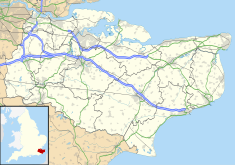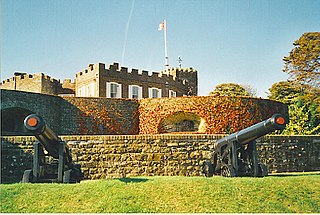
Walmer is a town in the district of Dover, Kent, in England. Located on the coast, the parish of Walmer is six miles (9.7 km) south-east of Sandwich, Kent. Largely residential, its coastline and castle attract many visitors. It has a population of 6,693 (2001), increasing to 8,178 at the 2011 Census.

Deal is a town in Kent, England, which lies where the North Sea and the English Channel meet, 8 miles (13 km) north-east of Dover and 8 miles (13 km) south of Ramsgate. It is a former fishing, mining and garrison town whose history is closely linked to the anchorage in the Downs. Close to Deal is Walmer, a possible location for Julius Caesar's first arrival in Britain.
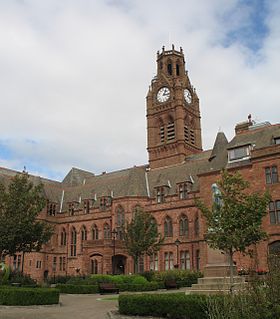
Barrow-in-Furness Town Hall is a Gothic Revival style municipal building in Barrow-in-Furness, Cumbria, England. The building, which serves as the base of Barrow Borough Council, lies within a Conservation Area with Grade II* listed status.

The Old Town Hall, Richmond on Whittaker Avenue in Richmond, London is a former municipal building which from 1893 to 1965 served as the town hall for the Municipal Borough of Richmond.

Bideford Town Hall is a municipal building at the corner of Bridge Street and New Road in Bideford, Devon, England. The building, which is the meeting place of Bideford Town Council, is a Grade II listed building.
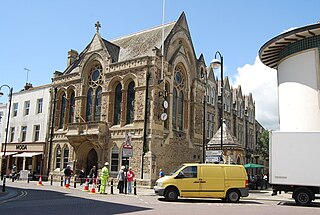
Hastings Town Hall is a municipal building in Queen's Road, Hastings, East Sussex, England. The town hall, which was the meeting place of Hastings Borough Council, is a Grade II listed building.

Farnham Town Hall is a municipal building in South Street, Farnham, Surrey, England. It provides the offices and the meeting place of Farnham Town Council.

Huntingdon Town Hall is a municipal structure on Market Hill in Huntingdon, Cambridgeshire, England. The town hall, which was the headquarters of Huntingdon Borough Council, is a Grade II* listed building.

Godalming Borough Hall is a municipal building in Bridge Street in Godalming, England. The building is the meeting place of Godalming Town Council.
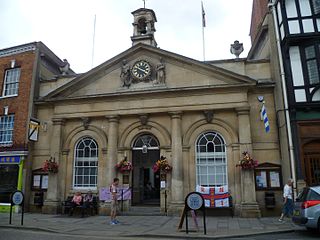
Tewkesbury Town Hall is a municipal building in the High Street in Tewkesbury, Gloucestershire, England. The building, which is the meeting place of Tewkesbury Town Council, is a Grade II* listed building.

Tiverton Town Hall is a municipal building in St Andrew Street in Tiverton, Devon, England. The structure, which was the meeting place of Tiverton Borough Council, is a Grade II listed building.

Devizes Town Hall is a municipal building in St John's Street in Devizes, Wiltshire, England. The structure, which is the meeting place of Devizes Town Council, is a Grade II* listed building.

The Old Town Hall, sometimes referred to as the Moot Hall, is a municipal building in Church Street, Clitheroe, Lancashire, England. The structure, which was the meeting place of Clitheroe Borough Council, is a Grade II listed building.
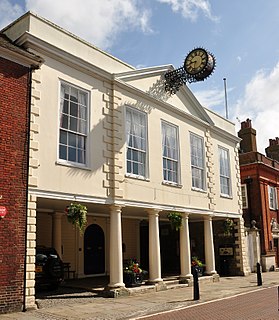
Hythe Town Hall is a municipal building in the High Street, Hythe, Kent, England. The structure, which is the meeting place of Hythe Town Council, is a Grade II* listed building.

Glastonbury Town Hall is a municipal building in Magdalene Street, Glastonbury, Somerset, England. The structure, which is the meeting place of Glastonbury Town Council, is a Grade II* listed building.

New Romney Town Hall is a municipal structure in the High Street, New Romney, Kent, England. The structure, which is the meeting place of New Romney Town Council, is a Grade II listed building.
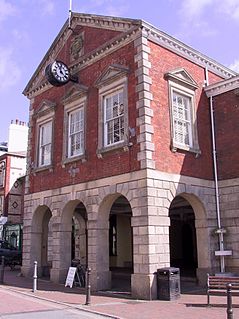
Great Torrington Town Hall is a municipal building in the High Street, Great Torrington, Devon, England. The town hall, which is the meeting place of Great Torrington Town Council, is a Grade II listed building.

Chipping Campden Town Hall is a municipal building in the High Street, Chipping Campden, Gloucestershire, England. The building, which is the meeting place of Chipping Campden Town Council, is a Grade II* listed building.
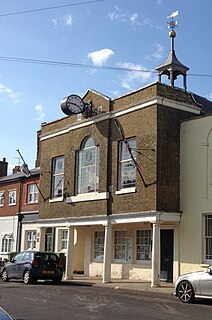
Queenborough Guildhall is a former municipal building in the High Street in Queenborough, Kent, England. The structure, which is currently used as a museum, is a Grade II listed building.
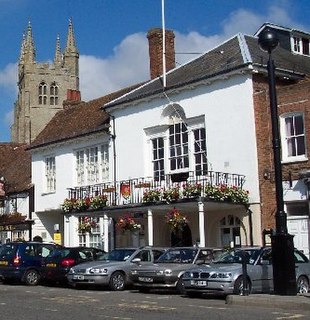
Tenterden Town Hall is a municipal building in the High Street in Tenterden, Kent, England. The structure, which is the meeting place of Tenterden Town Council, is a Grade II listed building.

